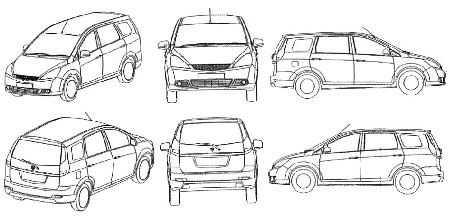Proton Exora MPV: BCM and a few more juicy details from the prototype test drive

Now that we’ve covered the initial driving experience with the upcoming 7-seater Proton Exora MPV, let’s get down to some technical details such as the chassis, dimensions, specifications and equipment level of the people mover.
Have a look after the jump for the juicy details.
Exora Weight and Dimensions Comparison
| Exora | Livina 1.6 | Avanza 1.5 | Rondo | Innova | |
| Kerb Weight | 1,380kg | 1,245kg | 1,120kg | 1,563kg | 1,575kg |
| Length | 4,592mm | 4,420mm | 4,150mm | 4,545mm | 4,580mm |
| Width | 1,809mm | 1,690mm | 1,630mm | 1,800mm | 1,770mm |
| Height | 1,691mm | 1,590mm | 1,695mm | 1,650mm | 1,755mm |
| Wheelbase | 2,730mm | 2,600mm | 2,655mm | 2,700mm | 2,750mm |
| Fuel Tank | 55L | 52L | 45L | 55L | 55L |
| MPV+7 Weight | 1,880kg | 1,745kg | 1,620kg | 2,063kg | 2,075kg |
| MPV+2+5 Weight | 1,730kg | 1,595kg | 1,470kg | 1,913kg | 1,925kg |
| Horsepower | 125hp | 105hp | 107hp | 145hp | 136hp |
| Torque | 150Nm | 150Nm | 141Nm | 189Nm | 182Nm |
| MPV+7 kg per hp | 15.04 | 16.62 | 15.14 | 14.23 | 15.26 |
| MPV+7 kg per Nm | 12.53 | 11.60 | 11.48 | 10.91 | 11.40 |
Above you can see a weight and dimensions comparison between the Exora and its similiarly-priced Rivals. The Exora is actually longer and wider than the Innova and even the Rondo but it is much lighter, instead being closer to the Grand Livina’s weight despite being a bigger vehicle. I’ve also added two gross vehicle weight calculations - one with a load of 7 adults and another with 2 adults (MPV+7) and 5 children (MPV+5+2).
What’s also interesting is the two rows at the bottom - how many kgs of metal, flesh and bone (as in the MPV and occupants, not some Terminator cyborg) the engine has to pull along. This is not a completely accurate indicator of performance as there are many other variables such as the weight of fluids, gear ratio and transmission loss, but it can be used as a rough indicator.
The MPV actually has to pull along the most kg per Newton meter of torque, though its actually by only a small margin of about slightly over 1kg compared to the Innova. Thus performance under full load could likely similiar to what I experienced in my prototype test drive. 1kg out of 12kg is slightly less than 10%, so in a way can it be said the Exora would feel approximately 10% less powerful than its competitors? Does anyone here have experience with the listed competitors under full load? Please share your experience in the comments section for benefit of all? Once again, I’d like to say this is not a completely accurate way of comparing performance as there are many other factors such as gear ratios and transmission loss.
Proton Exora Chassis
Underpinning the Proton Exora MPV is a monocoque chassis with a 2,730mm wheelbase. Using a car-like monocoque chassis gives it superior ride comfort and handling over body-on-frame rivals. It rides on MacPherson struts at the front and a torsion beam at the rear. Development time for this chassis benefitted from many ideas and experiences gained from developing the Saga and Savvy’s platforms, which also use a similiar suspension setup.
Thus in some ways you could say the Exora chassis is a larger and stronger version of the Saga chassis because the people who were behind the development are the same, thus its only natural that some ideas and techniques are reused.
An improvement over all Proton models is the usage of a Body Control Module. It essentially controls some various basic car functions such as wipers, signal lamps, brake lamps, and etcetera. It allows Proton to program some intelligence into various car features so that in some cases they might even function automatically when deemed needed, instead of everything having to require some kind of driver input or activation to work. Alot of modern cars already have the ability to do all of these so Proton has caught up. Here are the features that the BCM allowed Proton to add to the Proton Exora:
Proton Exora Body Control Module
* A battery saver for room lamps, luggage and key ring illumination. These turn off after 30 seconds to ensure they do not make your battery flat if for some reason they are left in a situation where they are on all the time.
* Follow-me-home headlamps stay on for a certain period of time to help light up your walkway when you park and want to enter your house.
* The battery level for the remote key is indicated on the car’s instrument panel briefly when you turn the ignition on. The remote key has a range of 20 meters.
* The remote control will not work if your front door is not closed. The vehicle will also remind you if you activate a remote command if the rear door is not closed.
* There is a door open indicator on the instrument panel that indicates exactly which door, engine bay hood or rear hatch is not closed.
* There is a door opening warning when you reach a speed of 7km/h if any doors are open.
* Tap feature for the signal indicator stalk. This is similiar to alot of modern cars - you just have to tap the indicator stalk (not press fully) for the signal to flash 3 times to indicate a lane change and stop automatically, no need to press fully to turn on and reach for it again to deactivate it.
* Dim-in and dim-out feature for the interior room lamps - Proton says this is better for the eyes at night and it also adds a certain touch of class. The interior room lamps turn off automatically after you lock the car, or they also stay on for 30 seconds and then fade out in 2.8 seconds. When you unlock the car, the room light fade-in in 3.4 seconds.
* Front and rear wiper washer drip wiping - automatically wipe to remove excess water. What happens is when you operate the front washer, it will wipe 4 times and then pause for 5 seconds and then wipe one more time, to remove all the excess water effectively. This is because some of the washer liquid from the top of the windscreen will slowly drip down after the initial wiping, so the last wipe completely removes the washer water.
* Programmable front wiper interval. This can be anything from 1 seconds to 25 seconds. The default is 4 seconds. This is how you program it - you put it into INT and then back to off. Then you wait for the duration you want and turn switch it to INT again. The time duration you waited will become the new interval, up to a max of 25 seconds.
* The rear wiper turns on automatically when you engage reverse gear if your front wipers are on.
* If in SLOW mode, the front wiper changes mode to INT mode when you bring the MPV to a complete stop, let’s say in a traffic jam in the rain.
* The remote unlocks the drivers door only if pushed once - probably push twice to unlock all doors. Apparently you are able to configure this to unlock all doors at once by default.
* There is an alarm activation history kept but I am not sure how to access it, perhaps only at the service center.
* The doors will lock automatically once you reach a speed of 20km/h.
* The doors will unlock automatically once you remove the key from the key barrel.
* All doors unlock automatically upon a crash via a signal coming from the airbag control unit.
* If you perform any sudden braking at speeds of at least 96km/h, the hazard lights will flash automatically.
So there we go, quite an interesting and extensive list of the features that the BCM provides the Proton Exora. It will be easy to add other features such as automatic headlamps and rain sensing wipers to the Exora because of the BCM, as all you need to do is add the appropriate sensor and programming so this may be a preview of what might come during the facelifts in a few years time.
Proton Exora H-Line DVD Entertainment System
The H-Line model that we tested also came with a DVD entertainment system mounted at the roof of the 2nd row for both the 2nd and 3rd row’s enjoyment. It can accept DVDs and can also read files from an SD card. I didn’t try whether the system supports reading DIVX or AVI files from the SD card but apparently picture viewing works so it will be quite interesting for a family to view photos from a trip to Sunway Lagoon, Port Dickson or any other destination immediately on the way home.
The DVD entertainment system sends its audio signals to the head-unit at the front via a FM transmitter system. This probably cuts some assembly cost and time as you don’t need to wire the system up, but this also means audio quality is the same as FM. You can set what frequencies you want to transmit at from the DVD system, and then tune in to the corresponding frequency on the Exora’s headunit.
We were driving prototype models without the finalised speakers and sound stage setup so its pointless to talk about sound quality at this time. All I can say is at least the prototype had commendable sound proofing so you can at least watch movies without much outside noise disturbing your experience.
The H-Line model also had leather seats and an armrest for the driver, as well as a spoiler at the back while the M-Line did not. I believe there’s only 1 month left until the Exora rolls out into the showrooms as a tentative launch date of mid-April 2009 was indicated. There will be a full write-up based on the production model then, so stay tuned!








(1).png)

No comments
Post a Comment